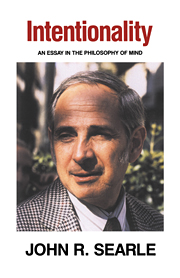Book contents
- Frontmatter
- Contents
- Acknowledgements
- Introduction
- 1 The nature of Intentional states
- 2 The Intentionality of perception
- 3 Intention and action
- 4 Intentional causation
- 5 The Background
- 6 Meaning
- 7 Intensional reports of Intentional states and speech acts
- 8 Are meanings in the head?
- 9 Proper names and Intentionality
- 10 Epilogue: Intentionality and the brain
- Subject index
- Name index
8 - Are meanings in the head?
Published online by Cambridge University Press: 05 June 2012
- Frontmatter
- Contents
- Acknowledgements
- Introduction
- 1 The nature of Intentional states
- 2 The Intentionality of perception
- 3 Intention and action
- 4 Intentional causation
- 5 The Background
- 6 Meaning
- 7 Intensional reports of Intentional states and speech acts
- 8 Are meanings in the head?
- 9 Proper names and Intentionality
- 10 Epilogue: Intentionality and the brain
- Subject index
- Name index
Summary
The fundamental question of the philosophy of language has always been: How does language relate to reality? The answer I proposed to that question in Speech Acts was that language relates to reality in virtue of the fact that speakers so relate it in the performance of linguistic acts. The original question then reduces to one of analyzing the nature and conditions of the possibility of these acts. In this book I have tried to ground that analysis further in the Intentionality of the mind: the question, “How does language relate to reality?” is only a special case of the question, “How does the mind relate to reality?”, and just as the question about language reduced to one about various sorts of speech acts, so the question about the mind reduces to one about the various forms of Intentionality, the representational capacities of speech acts being simply a special case of derived Intentionality.
On one interpretation of Frege, my general approach to Intentionality is a matter of revising and extending Frege's conception of “Sinn” to Intentionality in general, including perception and other forms of self-reference; and my approach to the special problem of reference is in some respects Fregean in spirit, though, of course, not in detail. Specifically, it is possible to distinguish at least two independent strands in Frege's account of the relations between expressions and objects. First, in his account of the Sinn and Bedeutung of Eigennamen, an expression refers to an object because the object fits or satisfies the Sinn associated with the expression.
- Type
- Chapter
- Information
- IntentionalityAn Essay in the Philosophy of Mind, pp. 197 - 230Publisher: Cambridge University PressPrint publication year: 1983
- 2
- Cited by



